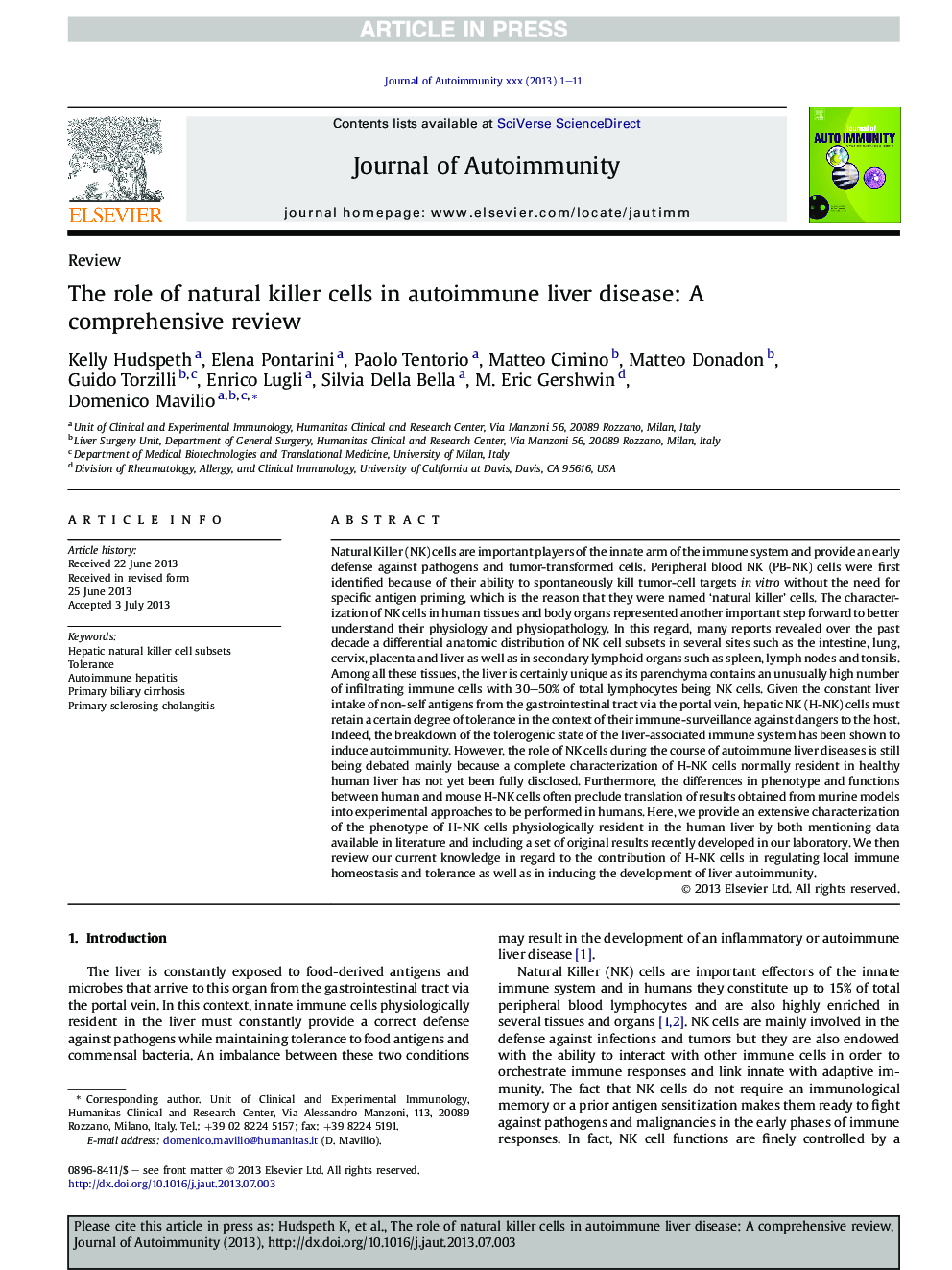| کد مقاله | کد نشریه | سال انتشار | مقاله انگلیسی | نسخه تمام متن |
|---|---|---|---|---|
| 6119306 | 1592302 | 2013 | 11 صفحه PDF | دانلود رایگان |
عنوان انگلیسی مقاله ISI
The role of natural killer cells in autoimmune liver disease: A comprehensive review
ترجمه فارسی عنوان
نقش سلول های قاتل طبیعی در بیماری های خودایمنی کبد: یک بررسی جامع
دانلود مقاله + سفارش ترجمه
دانلود مقاله ISI انگلیسی
رایگان برای ایرانیان
کلمات کلیدی
زیر مجموعه های سلولی قاتل کبدی، تحمل، هپاتیت اتوایمیون، سیروز اولیه صفراوی، کلانژیت اسکلروزیس اولیه،
موضوعات مرتبط
علوم زیستی و بیوفناوری
ایمنی شناسی و میکروب شناسی
ایمونولوژی
چکیده انگلیسی
Natural Killer (NK) cells are important players of the innate arm of the immune system and provide an early defense against pathogens and tumor-transformed cells. Peripheral blood NK (PB-NK) cells were first identified because of their ability to spontaneously kill tumor-cell targets in vitro without the need for specific antigen priming, which is the reason that they were named 'natural killer' cells. The characterization of NK cells in human tissues and body organs represented another important step forward to better understand their physiology and physiopathology. In this regard, many reports revealed over the past decade a differential anatomic distribution of NK cell subsets in several sites such as the intestine, lung, cervix, placenta and liver as well as in secondary lymphoid organs such as spleen, lymph nodes and tonsils. Among all these tissues, the liver is certainly unique as its parenchyma contains an unusually high number of infiltrating immune cells with 30-50% of total lymphocytes being NK cells. Given the constant liver intake of non-self antigens from the gastrointestinal tract via the portal vein, hepatic NK (H-NK) cells must retain a certain degree of tolerance in the context of their immune-surveillance against dangers to the host. Indeed, the breakdown of the tolerogenic state of the liver-associated immune system has been shown to induce autoimmunity. However, the role of NK cells during the course of autoimmune liver diseases is still being debated mainly because a complete characterization of H-NK cells normally resident in healthy human liver has not yet been fully disclosed. Furthermore, the differences in phenotype and functions between human and mouse H-NK cells often preclude translation of results obtained from murine models into experimental approaches to be performed in humans. Here, we provide an extensive characterization of the phenotype of H-NK cells physiologically resident in the human liver by both mentioning data available in literature and including a set of original results recently developed in our laboratory. We then review our current knowledge in regard to the contribution of H-NK cells in regulating local immune homeostasis and tolerance as well as in inducing the development of liver autoimmunity.
ناشر
Database: Elsevier - ScienceDirect (ساینس دایرکت)
Journal: Journal of Autoimmunity - Volume 46, October 2013, Pages 55-65
Journal: Journal of Autoimmunity - Volume 46, October 2013, Pages 55-65
نویسندگان
Kelly Hudspeth, Elena Pontarini, Paolo Tentorio, Matteo Cimino, Matteo Donadon, Guido Torzilli, Enrico Lugli, Silvia Della Bella, M. Eric Gershwin, Domenico Mavilio,
